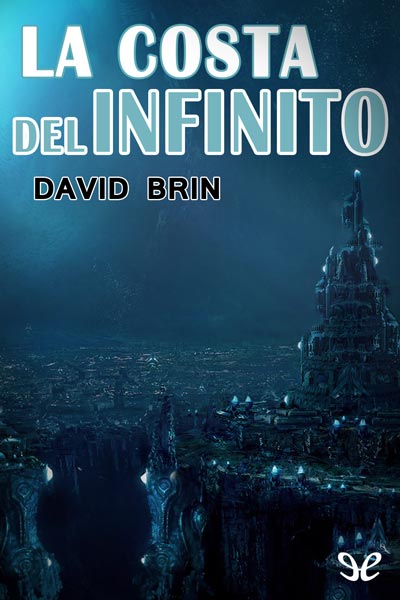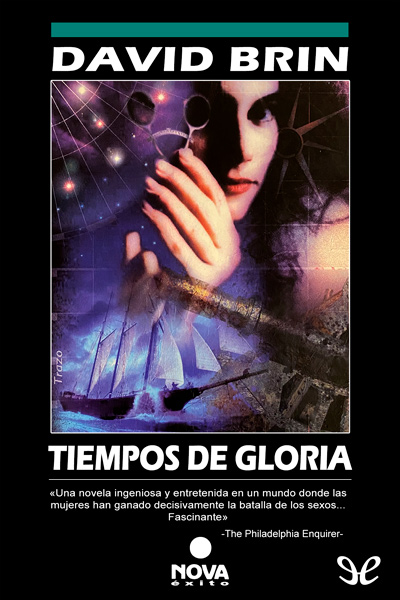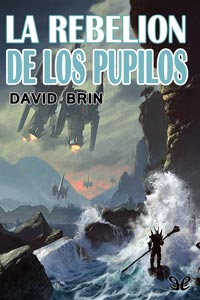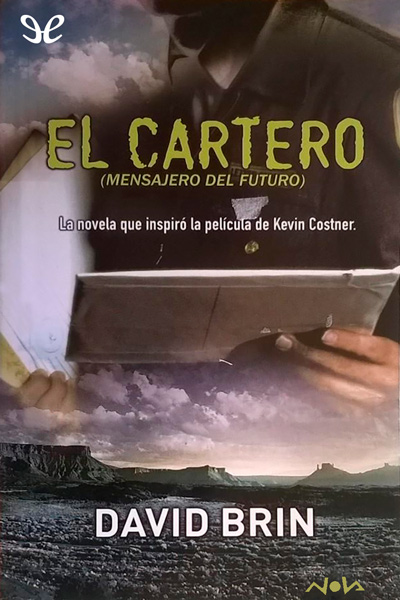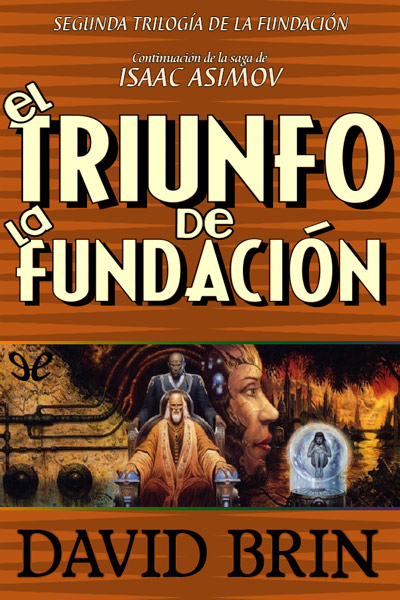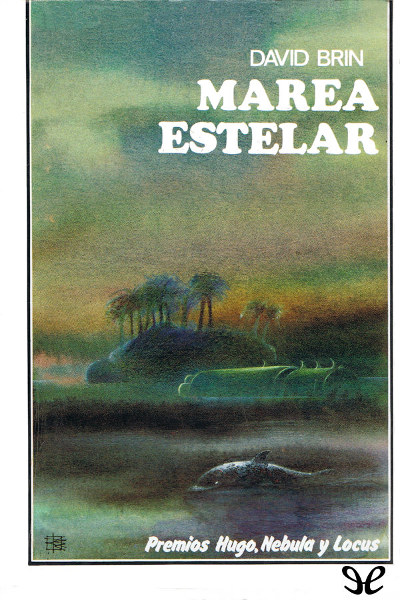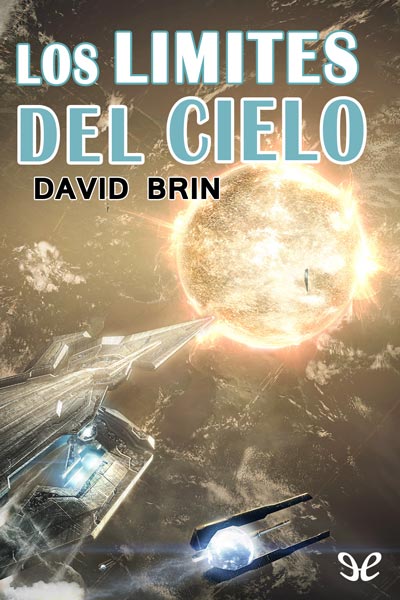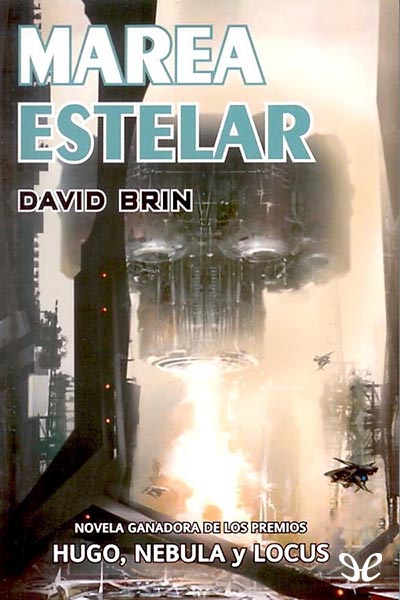oleebook.com
El triunfo de la fundacion de David Brin
de David Brin - Género: Ficcion
Sinopsis
David, Brin Year: 2009
Libros Recomendados - Relacionados
Reseñas Varias sobre este libro
Als festgestellt wurde, daß die Flöte des hl. Veit, eine vermeintliche 1000ährige Reliquie in Wirklichkeit ein 5 Millionen Jahre alter Plastik-Schlauch von einem amerikanischen Militär-Jeep ist, wird klar, daß Zeitreisen doch möglich sind.
In Wolfgang Jeschkes Romanerstling wird geschildert, wie die westliche Welt versucht den Arabern mittels Zeitreise das Öl zu klauen, allerdings haben die Zeitreisenden die Rechnung ohne die Physik gemacht, die Zeitparadoxone machen ihnen zu schaffen... favorites oeko-thriller science-fiction ...more7 s Ute247 5
In diesem Buch hat Wolfgang Jeschke alles bedacht und beschrieben, was es (aus Sicht der SF) über Zeitreisen zu sagen gibt; das beste was ich je über Zeitreisen gelesen habe; wenn man mal von Captain Janeway absieht - "Ich denke nicht über Zeitreisen nach, davon bekommt man nur Kopfschmerzen." (sinngemäß)
Besonders die vielen Details machen das Buch lesenswert - z.B. auf Seite 219 das Gespräch über Mark Twain.
erster Satz - 1959 war Steve Stanley sechszehn Jahre alt.
letzter - Als die Sonne aufging, hatte das weite helle Herz Afrikas sie aufgenommen.
Jetzt gibt es ein Hörspiel - muß ich mir unbedingt besorgen.lieblingsbuch roman science-fiction6 s Alle Bücher müssen gelesen werden383 41
Klassische deutsche SF, das Buch ist angenehm straff.4 s ?ukasz13 3
So much wasted potential for a brilliant book.3 s Jersy891 102
Der Roman ist faszinierend, leider aber lange Zeit nicht mitreißend. Es dauert ewig, bis wir irgendwelche handelnde Figuren haben und noch länger, bis ich mich für sie und ihre Erlebnisse interessiert habe. Danach bin ich ihnen zwar wirklich gerne gefolgt, aber ein Großteil des Buches war mir zu unpersönlich.
Glücklicherweise kann in einem Buch noch etwas anderes spannend sein als die Handlung und Charaktere, denn die Ideen des Autoren reißen das wieder raus. Die ersten Kapitel, die von anachronistischen Artifakten berichten sind interessant und machen neugierig, und sowohl die Version der vormenschlichen Vergangenheit, die Jeschke sich hier ausdenkt, als auch die Art, wie die scheinbar Gestrandeten mit ihrem Schicksal umgehen, hat mich in den Bann gerissen.kurd-lasswitz-preis read-2022 science-fiction ...more2 s Otto Otto1 review
Jeschkes Roman hat viele Fans. Ich bin keiner davon.
Der Augangspunkt der Geschichte ist spannend und interessant und hätte durchaus das Potenzial zu einem ganz großen Zeitreise-Roman. Und dennoch hat man beim Lesen ständig den Eindruck, es mit einem 200-seitigen Wikipedia-Eintrag zu tun zu haben.
Alle beteiligten Personen bleiben bestenfalls skizzenhaft. Nirgendwo gibt es eine persönliche Entwicklung; die Menschen scheinen seltsam distanziert von dem, was um sie herum vorgeht: "Hoppla, wir sitzen fünf Millionen Jahre in der Vergangenheit fest, und es gibt keine Hoffnung auf eine Rückkehr. Naja, machen wir halt das Beste draus..."
In dem Roman gibt es eine ganze Reihe von spannenden Ideen, von denen leider kaum eine konsequent verfolgt wird:
* Gigantische Statuen in Gibraltar werden auf einer handvoll Zeilen abgehakt. Motto: Da war wohl jemand vor uns da...
* Geheimnisvolle Bunkeranlagen im Norden Europas? Vielleicht ein Weltraumbahnhof, aber ist ja eigentlich auch egal.
* Einer der Gestrandeten erstellt ein riesiges Diagramm, welches die wichtigsten Weichen der verschiedenen Realitäten beschreibt. Nur, so richtig interessieren tut es niemanden.
* Es sitzt eine ganze Reihe von feindlichen Fraktionen in der Vergangenheit fest. Doch außer sich gegenseitig mit Raketen zu beschießen, scheint niemand einen langfristigen Plan zu haben.
* Und dann war da noch die Sache mit Atlantis...
Alles in allem empfinde ich den "letzten Tag der Schöpfung" als vertane Chance. Der Autor hatte eine ganze Reihe von spannenden Ideen, aber hat es leider versäumt, einen packenden Roman daraus zu machen.2 s Sargeatm335 7
2,5 Sterne
Die grundlegende Idee des Buches finde ich faszinierend: Zeitreisen als Waffe. Zunächst nur im Kampf um Ressourcen, später dann weit aggressiver genutzt, um die Zukunft zu beeinflussen.
Insofern gestaltete sich mein Einstieg auch recht flott.
Leider erlahmte das Interesse nach dem ersten Drittel aber spürbar, denn dem Autor gelingt es nicht, Interesse an den Figuren zu wecken.
Dass es keine Hoffnung für die armen Teufel gibt, die auf diese Zeitreise geschickt wurden, ist frühzeitig klar.
So schienen mir viele Begebenheiten eher als Füllmaterial zu dienen, damit man anhand verschiedener Figuren aus der Zukunft erkennen konnte, wie sich die unterschiedlichen Zukunftsversionen entwickelt haben.
Dieser Ansatz ist sicher auch etwas gewöhnungsbedürftig, denn obwohl es verschiedenste Zukunftsversionen gibt, bleibt die Vergangenheit gleich.
Aber nun ja, Zeitreise-Geschichten bewegen sich immer auf dem schmalen Grat zum Paradoxon.
Letztlich gestalteten sich die späteren 2/3 des Buches sehr zäh und ziehen die Wertung nach unten.time-travel2 s Stephen Rowland1,245 55
3½. I can't recall any other novel that has interested and compelled me so much at the start only to drag through a strikingly prosaic second act, and be slightly redeemed by the still-disappointing ending. Seriously, the first 100 pages of this German science fiction novel contain some of the most unique and fascinating ideas I've ever encountered. I was certain this would be some sort of forgotten masterpiece, but it's as if the author just went to sleep for the next 100 and tried groggily to wake himself up for the end.2 s Keisha35
Fichtrement bien écrit, mais l'impression de potentiel mal exploité. Lu en français, un vieux poche de 1981.2 s Michaela Mitsuko Martinko33 34
Vdycky mám strach dívat se na filmy a ?íst knihy, které jsem jako malá milovala... nikdy nevíte, co se z toho v dosp?losti vyklube. (ano, mluvím o tob?, Trone!)
První ?tení Posledního dne stvo?ení nebylo dokonalé. Pamatuju si, jak jsem se zpo?átku u knihy nudila, na vkus pubertální milovnice sci-fi povídek jsem narazila na p?íli mnoho zdlouhavých fakt? a artefakt? z minulosti. Pak u to lo ráz na ráz a nakonec se z toho vyklubal p?íb?h s pointou, která se mi promítá p?ed o?ima dodnes.
Dokonalý kulturní a existenciální ok, který nabízí, je prost? nezapomenutelný a i po letech m? ohromil. Jako dosp?lá u chápu hlubí a d?siv?jí konotace i filozofický a existenciální dopad.
Na druhou stranu, kniha rozhodn? nechává hodn? nevyuitého potenciálu. Nevím pro? autora nikdo nep?emluvil k napsání pokra?ování, materiálu by rozhodn? m?l víc ne dost, fantazie a podn?t? evidentn? také. Kniha ke konci p?sobí hodn? usp?chan? a p?íb?h nedokon?en?. Moná to bylo dobou, kdy byla kniha napsaná, ale kadopádn? je to velká koda.
P?esto a práv? proto váhám mezi 4 a 5 hv?zdi?kami. Nedotaené vypráv?ní vs. kultovní kniha, která m? vhodila do sv?ta paralelních sv?t? a cestování v ?ase a výrazn? ovlivnila mé vid?ní sv?ta. A nejde o to vlastn? p?edevím? P?e?etla jsem hodn? skv?lých knih, které si u vak tém?? nevybavím, na Poslední den stvo?ení ale nezapomenu nikdy. Take beru ?íslo 5, ?istá srdcovka.1 Niya108 24
The beginning and the whole idea and view on time traveling was brilliant and at first I thought that this could be my new favourite book to come back to but then the author ruined it all. Could've been SO much better!1 Wouter7
Got on this book by playing the computer game game Original War, which is (loosely) based on the framework of the story of the book - including elements of the chronotron project and the smart predecessors of the human sapien and takes place in the same world as the book does.
The premise of this book is great and so is the first half of the story which describes the history and discovery of time-travel and the invention of the chronotron project. It's told in a somewhat descriptive and technical manner but is intriguing and fast paced enough to build the framework of the story and hype up to the second part of the book.
Which begins great with the landing of the time-travelers (Chronotronauts?) in the old world and the whole setting of the past. But when Stanley and his partner arrives at their destination, the story kinda stops. There are still a few events happening, but the plot dries out and besides for the scenario and world building, there is not much to read for. The characters are not that interesting and seem to be emotionally distant at times, the story jumps and hops between events without clear indication of timing and the last 30-or-so pages the story comes to a grinding halt and those pages are a crime to read trough and go very slowly.
I want to this book because the setting and world-building is great, but the story leaves me dissatisfied and the end of the book is such a slough, took me almost half a year to go through. Wouldn't mind reading another book taking place in the same world though, but I see those changes slim.personal-collection ????????? ???????????Author 8 books40
21 ??????? 2019 ?. 16:51 ?.
????????? ???????????.?? ? ?????, ?? ?????? ?.???. "???? ??????????" - ?.?. ?????, ???????? ? ???????? ??? ???????. ?? ?????????? ?? ???????? ???? ???????? ????????????? ?????? ?? ????? ????????? "??????? ??? ???", ????? ? "???????? ?? ???????" ?? ??????? ????. ???? ?????? ?? ????????? ?? ??????????? ??? ??????? ???????????? ?? ??????? ??????? ???????? ?????, ? ???????? ????? "?????????? ??? ?? ????????????" ?? ?? ??????? ????????? ??????? ?? ???? ? ?????????????? ???? ?? ???, ????? ???????? ? ???????? ???? ?? ????? ? ????????, ?? ?? ???????? ??????? ?? ????????? ??????? ? ?? ???????? ??????????????? ?? ???????? ????.
?????? ?????? ???? ??? Leland M Porter32
Start with a really fascinating idea, then introduce self-serving idiots as the management and direction of a world-altering discovery, then ruin the planet. Nope. Interesting premise but (opinion only) botched execution. Zora291 2
4,5/5 zoe36
2.5!
Es war eine interessante Idee, aber es gab zu viel zu bemängeln: Charaktere waren (größtenteils) eindimensional, es hat sich gezogen und der Schreibstil hat mir nicht sonderlich gefallen.germanistik Ond?ej Podzemský12
Super scifi zahrávající si s cestováním v ?ase. koda, e tento sv?t nedostal více prostoru :)sci-fi Prim108 1 follower
wo auch immer der Mensch hinkommt, dominiert er rücksichtslos auf Kosten seiner Umwelt. Zeitreisen... der Kampf um Öl......a real pageturner.... in einem Ruck gelesen
Autor del comentario:
=================================
I think that giving two stars to any of the books from this trilogy is actually being very generous, and is mostly because of the names involved and thus the quality they brought to the books. Nevertheless the books are a complete failure despite being set in Asimov's universe. The authors attempted to bring some of Asimov's genius to the table but were unable to convey their ideas in the gloriously simple and direct fashion that Asimov could. As a result the entire trilogy is extremely convoluted and despite exploring interesting topics in a familiar setting is nearly impossible to follow.
The trilogy was a good idea but unfortunately I believe it's execution proved to be too difficult even for the authors involved.15 s Trish2,135 3,653
*sighs* This second trilogy really was a waste of time, no matter how prolific the authors might be.
Hari is an old man in this third book. He leaves on a yacht to other planets on the invitation from a bureaucrat because he sees a parallel between certain soils on other planets and psychohistory. If you're raising your eyebrows now, welcome to the club. What was even worse, though, was that the yacht is overtaken by rebels who are then overtaken by robots - the rebels introducing Hari to ancient ships and data capsules that are subsequently destroyed by the robots, which all left me asking WHY?!
The next part in the book has Dors as the main character. Yes, at this point it's no spoiler that she has been reconstructed. Why? Good question. Here, she meets a robot whose three laws have been erased. This robot also has the head of Giskard (the robot who, with Daneel, formed the zeroth law). For some reason and somehow (and I never much d that concept being introduced despite how it shows the robots' evolution), they came up with the law but without consulting a single human being. So this part ties back into the examination of how good the zeroth law actually is for humanity. The biggest problem I had with this part (apart form the premise) is that Dors, who was Hari's wife if you'll remember, becomes a rebel and fights for cyborgs in the end.
The third part is a conversation between Daneel and his possible successor.
In the fourth part, all factions come together on Trantor. The actual conflict then is the fight against the Calvinist robots (we know they are defeated because the trilogy has to integrate back into Asimov's original trilogy). Afterwards, Hari and Daneel have quite a longwinded philosophical discussion about whether or not Galaxia will dominate the Second Empire or if there will be an equilibrium between it and the two Foundations.
The writing style was definitely the best of the three but I gotta be honest with you: I still think it was a mistake that the Asimov Estate allowed or even commissioned these books. To me, it feels a money-grabbing scheme by Asimov's heirs. And it's a shame!
Maybe it was meant to give further insight and/or new perspectives, but it just doesn't work.
This was definitely the best out of the three so technically I should give this 3 stars, but I gave that same rating to Forward the Foundation and this was not as good as that one. Thus, this gets 2.5 stars, which GR won't let me show. But just so you guys know in case you're considering reading these.
Alas, only Asimov's own works coming up now so while I'm really frustrated and unhappy, I will read the entire Foundation cycle now.14 s BradleyAuthor 5 books4,414
I'm of two minds on this book as well. If I were to only judge it within the framework of the Foundation series that Asimov wrote, it would probably drive me nuts. But judging it based on the fundamentals that Benford and Bear wrote about in the Second Foundation Trilogy books, with all the simulated minds, the many robots, their factions, and the hint that Chaos really would be a character, itself, then this book is actually rather interesting.
It still doesn't do it for me in Asimov's universe, despite the inclusion of Hari Seldon, Dors, and a very, very old robot. If it had been an original novel written for its own sake, released from the constraints of ALL other works, then I honestly think it would have been pretty great.
A point in its favor: massive galactic empire being overwhelmed by waves of telepathic machines destroying organics. This kind of thing always gives me a thrill. Of course, the theme is fairly common, but the real joy comes from the way it is developed. And Brin has a cool style.
But constrained as this is, this got somewhat hard to get through, hurting my enjoyment of Asimov's originals while making me annoyed because I almost always enjoyed Brin's work.
Hence, conflicted.
Even so, there were a number of cool bits, so it wasn't a complete wash.
Would I recommend Foundation fans to read this secondary trilogy? Nah. Not really. Not unless you REALLY want a dilution of great psychohistorian ideas and Robots.
2021-shelf sci-fi13 s Gosh43 19
Brin has some very interesting ideas in this book, but I think overall it's very poorly executed. He turns Daneel into a crazed megalomaniac and makes the robots responsible for the entire course of human history, and he attempts to explain Asimov's other books in terms of this robot theory, which is an interesting concept, but I think Asimov would be rolling in his grave. This was also just really difficult to get into, and confusing to try to keep track of who was on which side when, who was betraying whom, etc. The second book is the best in this series, but I don't think it was worth reading the whole series, unless you're just really curious (which I was). 8 s Daniel McGill89 9
By far the best of the "new foundation trilogy" but I do not recommend reading the series, the guy who wrote the fist book did so much damage to the story to the point of not even using Asimov's physics that between them even Brin and the guy who wrote the middle book couldn't undo it all. Only read if you're a fanatical completionist.7 s Pablo Fern?ndezAuthor 5 books65
Formas de estropear una saga. Luego esto.5 s Jeremiah Johnson338 1 follower
This book was better than the previous two in this trilogy, but that isn't saying much.
Brin's writing is far superior to the other two authors, but I still couldn't get into the story. To his credit, they didn't leave him anything good to work with.
I am very torn over the notion that the robots were in charge of everything that happened throughout the Empire's history. While it makes sense and is believable, it doesn't seem it is true to what Asimov's vision for the universe was.
The characters were decent, but at times it was difficult to keep track of all the changing factions and alliances.4 s John DerderianAuthor 5 books
This was the best of the 3B trilogy, and the only one that felt at all in the spirit of Asimov's originals. You probably have to read the other two to really appreciate this one, and I can't really recommend that.4 s Phil GiuntaAuthor 21 books28
Isaac Asimov's classic Foundation series comes to a conclusion in a trilogy of novels each written by different noted SF authors. David Brin adequately delivers the final entry, Foundation's Triumph, with similar pacing and style as Greg Bear's Foundation and Chaos. Bear, Brin minimizes story elements introduced in Gregory Benford's opening book, Foundation's Fear. I was grateful for that, since Benford's 600 page sleeper was a disappointment and could have been trimmed by half.
I described Brin's book as "adequate" mostly due to an ending that, to this reader, seemed a chapter of exposition disguised as a philosophical discussion between aging protagonist Hari Seldon and the mysterious puppet-master, robot Daneel Olivaw. Both of these characters had been present from the very beginning of the Foundation series, with Olivaw then disguised as the galactic Emperor's right hand man, First Minister Eto Demerzel. Olivaw then vanished and re-appeared sparingly until the very end when elements threatened his grand plan for the future of humanity.
We learn in Brin's novel some startling facts about Olivaw's involvement in Hari Seldon's childhood years when the brilliant "mathist" began to show promise, alluding to the possibility that Olivaw had guided the burgeoning genius toward his career-defining discovery of "psychohistory"--a complex set of mathematical formulas for defining the future of the galactic Empire.
In the first half of Foundation's Triumph, Brin also picks up on Bear's introduction of "mentalics", humans with varying levels of telepathic abilities. It is clear that Seldon had not accounted for these elements in his psychohistorical equations and adapts to this by forming a secretive Second Foundation elsewhere in the galaxy. However, about mid-way through Brin's tale, the mentalics seem to fade into the background and the robots take the forefront. We learn more about the different sects of robots, some who follow Olivaw's teachings, others that oppose it, and yet more who fall somewhere in between.
Treated a bit more lightly by Brin are Seldon's robotic wife, Dors Venabili, and the emancipated robot Lodovik Trema. Sometime between Benford and Bear, Dors had faked her own death when she was recalled by Olivaw to be reassigned elsewhere. Trema was introduced in Foundation and Chaos as a robot once loyal to Olivaw but whose positronic brain was altered by a surge of neutrinos. This unexpected event caused Trema to question the Three Laws of Robotics set forth by Olivaw. Eventually, Trema decides that he is no longer bound by them and acts on his own volition.
Brin restricts Trema and Dors to the sidelines in Foundation's Triumph, at one point leaving them stranded in outer space for several chapters aboard one ship. Rather than completely abandoning them, however, Brin uses their predicament to soften Dors distrust of Trema. Shortly into the story, Dors is already questioning the motives of her master, Daneel Olivaw as a result of ancient robotic records given to her by Trema. By the end, Dors wants nothing more than to return to Hari Seldon's side one last time before he dies--a scene which Brin denies us. It never happens.
We'll never know if this is what the late Isaac Asimov intended for his beloved Foundation series. At the same time, I can appreciate the challenges faced by authors who undertake projects based in another writer's universe, especially when they are denied the benefit of that writer's consultation.
3 s Henry HerzAuthor 29 books133
This is the third installment of a post-Asimov Foundation trilogy. Consider the honor bestowed on Dr. Brin - being entrusted with this revered sci-fi classic. And he delivers the goods. He expands upon the Foundation universe in seamless fashion - I could easily have believed this was a newly discovered Asimov manuscript. The writing is smart and heartfelt. I found myself moved by the relationship between Hari and Dors. And I shared the characters' frustration when enormous archives of knowledge had to be destroyed. This is one more reason why Dr. Brin is in the pantheon of living sci-fi writers.3 s Colleen687 23
Brin's a good writer and I really d Asimov's Foundation Trilogy when I read it in college, but I didn't particularly this extension of the original. I guess utopias have lost their appeal. I didn't realize how devoid of action the original foundation books were. And this book was mostly conversations and theory. The omnicient computers run the universe and humans just have to follow their dictates. They've determined that some humans must be eliminated for the majority to be happy. Not exactly free will, and not easy to fight. It should have been a great battle, but it was strangely uninspiring.science-fiction2 s Jean Corbel149 6
Neither the (dated) perspective and style of Asimov nor the challenging universe of the Uplift universe of Brin. All in all, very desapointing and verbose - for a master Brin.sf1 Víctor116 3
Finally, I'm done with the last book of this trilogy and I just want to forget I ever read it. Foundation's Triumph is the kind of book that gets better the more time has passed after reading other Asimov books and the more you've forgotten about the Robot and Foundation series because it's very boring otherwise.
Foundation's Triumph takes place about two years after Foundation and Chaos and you better forget you ever read the Epilogue to Forward the Foundation. Because it's a trilogy and there most be some sense of continuity I imagine Gregory Benford telling David Brin "Remember to add Voltaire and Joan and Panucopia so the trilogy makes sense" and Brin rolling his eyes and replying "Fine! I'll add them!" I also imagine Greg Bear telling Brin to "add Klia and Brann, and Lodovic" and Brin replying "You know what? No, I won't, they're here only to make babies, and Lodovic will do nothing with his freedom."
The first few parts (about 3.5 out of 6) consist of summarizing the Robot and Foundation series. Here, most of the chapters involving Hari Seldon consist of exposition about the past or the future to come. You know, the future we already know and read in Foundation and he's all doom and gloom. It gets old really fast. The exposition of the past is to introduce plot holes that we don't need such as "A Children's Book of History" gifted to Hari by Daneel and written in a dead language that requires a special translator device. The chapters involving Daneel are pretty much the same, exposition about the past, explaining everything to a robot named Zun Lurrin and some more exposition about the future of the events to come after Foundation and Earth. It also gets old really fast but it's done to add "a layer of chaos" that didn't exist in the Asimov universe and to link different books and novels such as Pebble in the Sky.
Of the dumbest ideas I've read in this trilogy is the space elevator that takes you from Trantor to a space station where you can grab a taxi through a wormhole. That's up there along with the Voltaire and Joan of Arc sims. Hari Seldon is of course all doom and gloom about not wanting to be near the elevators in 30 or so years into the future. He'll be dead anyways. You know what I don't need in my life? Depressed Hari Seldon.
However, characters assassinations are not complete until this book is done with Daneel and Hari who turns out sabotaged the Galatic Empire and doomed it to fail. Hari also orchestrated the upcoming crisis in Anacreon. Psychohistory is a sham and will become useless/obsolete in 500 years. What the hell?
Part 4 is when the book picks up and there's not so much summary but actually starts to focus on the present. You know, the events you're actually willing to read to see how Brin expanded the Foundation universe. And now we can appreciate his writing style in full force: adds exclamation marks randomly for whatever reason, has the need to describe and repeat several times over the character descriptions that were introduced a few pages ago, and forgets about describing certain words never used in the trilogy before such as "zombies" or "cyborg."
We all know what a cyborg is but if it's the first time it's introduced in the trilogy, then maybe it's a good idea to define it instead of repeating all the other descriptions. "I wish I had brought my cyborg arms" muttered Lodovic Trema. What do you mean by that?! Because "cyborg woman" is clear enough but "cyborg arms" not so much.
The Zeroth Law
A robot must act in the long-range interest of humanity as a whole, and may overrule all other laws whenever it seems necessary for that ultimate good.
OH NO YOU DIDN'T!!! You know what this one should be called? The Fourth Law because it in no way precedes the First Law but sounds you need to know the three laws in order to overrule them. And this is a very different definition from the one found in, I don't know, Foundation and Earth, a book in the Foundation series where you don't need to know anything about the Robot series.
Overall, I don't hate this book, I just thoroughly dis it. This is not a Foundation book, this is a Robot book that some Foundation characters happen to participate in.1 Lis Carey2,193 117
SPOILERS AHEAD; SKIP IF YOU'RE PLANNING TO READ THIS AND DON'T WANT TO KNOW. This is the third book in the new Foundation trilogy, and it's quite an interesting addition. Hari Seldon, now old, isolated from what's left of his family by the exigencies of the Plan, and no longer a major object of suspicion for the Imperial security forces, decides to pursue a minor mystery brought to him by a minor bureaucrat who has been working at the mathematics of psychohistory as a hobby. The mystery concerns "tilling", the fact that nearly every human-inhabited planet was subjected to a major churning and grinding of the soil, making it suitable for agriculture, before humans arrived--in an expanding wave just ahead of the wave of human colonial expansion, in fact. There are exceptions, though, worlds where the process didn't happen, and substantial amounts of life un the life on most human worlds still survives. What do these anomalies mean? Why do they appear to track so well with the distribution of "chaos worlds", the worlds that experience a runaway outbreak of advancing science, art, and technology, before collapsing into equally runaway disaster?
Hari quickly discovers he's on the trail of something very important to psycohistory and the Plan, and Daneel, the Calvinian robots, imperial security, and several other forces are in hot pursuit of him. All fairly standard, except for where Brin takes this. Put simply, not only is psychohistory wrong, in the sense of inaccurate and inadequate to the job Hari's trying to do with it, but the goal is wrong. Hari's Plan rests on certain assumptions about human nature and human capacity that are not correct, based on facts which are incomplete and which have been subjected to seriously flawed analysis by Daneel and Giskard, which have never been checked against the wishes and opinions of humans. And Daneel has deliberately deceived Hari Seldon about these facts. He has done it from the best of motives, but he's wrong. He's concerned only with taking the safest path for the human species, not the best path; because of the Three Laws, and the Zeroth Law, he can't really distinguish between the two. Hari's plan is really Daneel's plan, and it's a mistake. At the end, it appears that Daneel's plan is triumphant; the hope for a genuinely human future--and perhaps a future where humans may finally be able to run the risk of meeting intelligent aliens--is that Hari's Foundation will be more robust than Hari or Daneel have believed, and prevent Daneel's rather horrifying, but very safe, Gaia plan from coming to fruition.
Altogether, a rather darker and more interesting book than I expected.This entire review has been hidden because of spoilers.Show full reviewf-sf1 Eric Korpela1 review
I look at this as a work of fan fiction, and I don't mean that as an insult. It's clear that David Brin knows and loves Asimov's work and that he has studied it in great detail. No doubt he's qualifies as a fan. And bringing all of the inconsistencies and loose threads of Asimov's works in one place must have required a huge amount of study. I'm talking years Ph.D. thesis level study. As such this may possibly be one of the greatest works of retroactive continuity (retcon) to ever be published. Its certainly the best I've read. Even in the straight jacket of a predefined start and ending position, I had a lot of episodes where I was thinking "I hadn't remembered that," or "That's a neat way to solve that inconsistency," or "that would have been cool if it happened, but then ending already exists." I think this book could have been a whole trilogy of its own, given the number of possibilities considered. 1 Jen232 33
This is it! I have finished my Asimov Foundation challenge. It only took me two years!
Foundation's Triumph picked up right where Foundation and Chaos left off. Hari Seldon isn't yet dead, though he really ought to be at this point. Hari doesn't have any real strategic plot importance other than to bear witness to the actual planning that would be/is revealed later-in-time-but-earlier-in-series-reading-order in Foundation and Earth. Since you are supposed to have read that novel first, it should come as no surprise that Hari learns of the plans for Galaxia, and "always right" human, and the location of Earth.
It should come as no surprise, given how much page real-estate our maligned SIMs occupied in Foundation's Fear, but they once again make a cameo. Now that the new trilogy is finished, I can once again reiterate my opinion that the SIMs are superfluous to the plot. Read or skip any parts that contain them; you won't miss or gain anything.
As Phil Giunta said in a different review, "Isaac Asimov's classic Foundation series comes to a conclusion in a trilogy of novels each written by different noted SF authors. David Brin adequately delivers the final entry, Foundation's Triumph, with similar pacing and style as Greg Bear's Foundation and Chaos. Bear, Brin minimizes story elements introduced in Gregory Benford's opening book, Foundation's Fear. I was grateful for that, since Benford's 600 page sleeper was a disappointment and could have been trimmed by half."
Not much more I can add to that.1 Brian199 8
When a favourite author writes in a favourite universe, you hope the results will be awesome. Unfortunately it was just "meh". Asimov's Hari Seldon molded the future of the galaxy and mankind as he knew it into his own vision of perfection. Brin's Seldon refuses to do the same. The situations, backgrounds and major players keep setting up to be special and repeatedly fall short.
Don't get me wrong, Brin doesn't slight Asimov's work, he just takes it in a direction that doesn't work for me. Maybe if I'd read the other two books in the Second Foundation trilogy by Benford and Bear I would have been more in tune with this one.
Foundation lovers ly can't resist another book in the same universe they love so well, just don't expect another Asimov Foundation novel and you won't be setting yourself up for disappointment.1 Nickolai762 8
????? ????????? ?????? ????? ????????, ? ?????, ??? ???? ???????? ??????. ?? ????? ???? ???? ??????. ?? ????, ?? ?? ?????? ?????? ????? ???????? ???? ???? ?????????? ???????, ?? ????? ??????? ????????? ??????????? ??????, ????? ??? ???????, ????? ???????, ????? ?????, ????? ?????? ????? ?????????????, ??????????? ?? ???????, ???? ???????????? ? ?.?. ? ?.?. ? ???? ??????? ????????? ????????, ??? ??? ?????? ?????? ??????? ? ???????? ? ????????, ??? ?? ??? ?????? ???????? ????? ???????? ? ???????????? ????????????, ??????? ??????????? ???????????? ????? ???????, ?? ?????? ? ??? ?????????? ? ????????? ?? ?????????. ? ????????????, ??????????, ???????? ????? ????, ?????????? ????? ??????? ?????? ? ?????????? ??????????? ????????.1 Rachel946 4
I had a lot of problems with this book. Instead of building upon the first two books, it's David Brin said, "Oh my gosh! I have to use everything Asimov has ever written to prove I've read his books!" There were so many story details and lines that were utterly irrelevant. It was really, really poorly done. Thanks to Brin, I think I understand Asimov's Foundation universe less than when I began! A massive disappointment.
On a side note, I was really troubled by his regular use of the phrase, "master race." Granted, humans are literally the masters of robots, but it's an ugly phrase, one best avoided.fantasy-sci-fi1 Christopher Page6 1 follower
It was pretty annoying to see that every time the author referenced who as speaking or what not he had to explain who they were or why they were significant, every single time. I don't recall if it was this way in the in the entire book, but it definitely was in the second half. Pay attention to when he references Sybil, or Joan, the repeated description/details of characters that we are well aware of drove me nuts. 1 Szymon Myalski8 18
This book gathers amazing collection of loosely connected threads from many Asimov's book, stitch them together and makes it all consistent and logical. It is a great achievement. David Brin finally made all Asimov's stories I know into one big and detailed history of over 20 000 years. And explained how difficult, demanding but also despotic was R. Daneel Olivaw's role in it.polish1 Rob7
The best of the Second Foundation Trilogy, picking up a number of the threads - or, as a prequel, putting them in place - that Asimov deployed in the original trilogy and the follow-up books; and, I'd have thought, pretty in line with the way Asimov developed the series after the first trilogy.1 Michael555 104
I hated every one if the three books in this trilogy Glad it's finally over and I can return to Asimov-written material.scifi-future-world1 Louis233 2
Foundations Triumph by David Brin is the third and final book of the Second Foundation Trilogy based on the works of Isaac Asimov. Again, focusing on Hari Seldons life (the major driving force in Asimovs original trilogy).
In this final volume Dr Brin does a decent job of lassoing a very big story and bringing it to a satisfying conclusion that involved two other authors (Gregory Benford & Greg Bear).
The protagonist, Hari Seldon, has completed (as much as he can) his science of psychohistory that allows him to model mankinds future and its galaxy spanning empire. His goal is to shorten an unavoidable collapse of civilization. The long-term plan was kicked off in the second volume, which now leaves Hari without much to do. He knows his plan is not perfect, but it was the best he could come up with.
In this book Hari is spirited away and finds himself in the middle of a conflict with many competing factions. All the groups have some legitimate ideas of what should happen to help humanity. But they are all at odds. In a nice example of science fiction being a genre of ideas, the story has many layers of, well talk. Conversations of pros and cons of the interests for humanity and other players in the galaxy. Some known and some only whispered about. I think David Brin handles it well as his original work follows along the same line. For me, ideas and discussions can be as exciting as fleets engaging in battle.
I felt this book left me with a richer feel of this world created by Asimov. There is so much more bubbling under the surface. Not every action is good, I found myself not agreeing with each decision. This let me feel engaged because of that. One had to ask, while this solution may not be perfect, does it at least help more people even in failure over another? Is it ethical to avoid engaging with some factions if it leaves them in the shadows and off stage?
Its always difficult to play in anothers universe, especially a complicated one that asks some big questions. I think this new trilogy did as well as can be expected without Isaac. The authors here definitely leveraged all his books in this universe and tried to stay true to what was charted out as they covered this previously unknown chapter of the history of this world.
Jay257 9
While I appreciate the work that Gregory Benford, Greg Bear, and David Brin put into writing the Second Foundation Trilogy and making sure it didn't conflict with anything Asimov himself wrote in this genre, I honestly think they shouldn't have gone to the trouble. Yes, the books do fill in some details of Hari Seldon's life (as well as the lives of some others whom I will not name because of spoilers), and they do serve to more closely unify the original Foundation trilogy with Asimov's later Foundation books as well earlier, seemingly unrelated novels (Pebble in the Sky, The Stars Dust, etc.); but Asimov had already done that pretty well himself in his later Foundation novels. This Second Foundation trilogy interjects a number of episodes and adventures into Seldon's later life that makes him seem almost a superhero and not "just" the brilliant academic that Asimov, to my reading, intended.
I really didn't care for the "sims" that were introduced in this trilogy; but there's discussion of some philosophical differences between groups of robots that is kind of interesting--largely because the three authors made it clear how the schism came about, and both sides make perfect sense. They also explain a little more about the early doings (I almost said "foundations") of the Second Foundation and the humans with psychic powers who would become so influential in the later books of Asimov's original works.
In terms of reading enjoyment, I probably d this volume best of the three in this trilogy, followed by the middle book Foundation and Chaos by Greg Bear (in that book and this one, "chaos" really does deserve prominent mention); Benford's Foundation's Fear I d least and was a struggle to get through.
There are still a number of other "successor" books by other authors, set in the Foundation universe, that I have challenged myself to read. I hope they hew a little close to what I think was Asimov's original intentions for this series of stories. EvilGeniusKant8
Aunque el libro es demasiado caotico y la historia no es gran cosa tampoco (En parte debido al daño residual que Benford dejó en la primera novela). Sí hay un par de cosas que si me gustan de esta trilogía:
1- La visión más oscura de Daneel Olivaw: El robot es presentado como una entidad manipuladoras dipuesto a cometer diversas atrocidades en nombre de su ley cero. En ningún momento se llega a cuestionar sinceramente si su intervención ha sido perjudicial a largo plazo o si por el contrario está cometiendo el mismo error de someter a la humanidad a la dependencia robótica como ocurría en los mundos espaciales. Cosa que Giskard consideraba un factor perjudicial.
2- Lodovik Trema: Es interesante ver a un robot que se opone a los planes de Olivaw, aunque la idea de que esté libre de las 3 leyes no se elabora ni se explota correctamente. Aunque sus partes en el segundo libro y como se va relacionando con los robots disidentes son entretenidas.
3- Trevize es una farsa: Trevize es el peor protagonista de toda la serie. La idea de un hombre que nunca se equivoca es ridícula. En esta novela Daneel revela que Trevize es sólo otra de sus manipulaciones, destinada a engañar a los robots que se le oponen, para que acepten su plan Galaxia.
Por lo demás hay muchos conceptos que no hacen sentido alguno. El caos parece más un recurso barato para justificar las acciones de Olivaw, las simulaciones no tienen nada que hacer, las entidades meméticas (que podrían haber hecho mucho sentido) se desaprovechan por completo, etc y etc.
Si van a leer algo de esta trilogía, lean el final del tercer libro. Seldon lanzando un desafío a Olivaw, profetizando el triunfo de su fundación sobre Galaxia es una parte que me gusta.This entire review has been hidden because of spoilers.Show full review José Luis Valenciano169 2 Read
Isaac Asimov (1920-1992), fue un escritor increiblemente prolífico y razonablemente coherente al crear el conjunto de su obra, sobre todo la saga de La Fundación. Sin embargo, dado que los títulos que integran dicho universo se escriben a lo largo de más de cuatro décadas y que, lamentablemente, Asimov falleciera antes de tiempo, no resulta extraño que quedaran flecos sueltos y preguntas sin respuesta: ¿Hay otras civilizaciones alienígenas? ¿Cómo es posible que la humanidad haya colonizado tantos mundos, aptos desde el inicio para sostener la vida tal como la conocemos? ¿Cómo es posible que la existencia de los robots sea secreta y, en una sociedad que permite el vuelo interestelar, ninguno de los 25 millones de mundos habitados los haya vuelto a crear?
Estas y otras cuestiones son las que buscaron responder la Segunda Trilogía de la Fundación,encargada por los herederos de Asimov a Gregory Benford, Greg Bear y David Brin.
Con una acción situada en diferentes etapas de la vida de Hari Seldon, creador de las matemáticas de la psicohistoria, estos tres autores responden a los enigmas planteados de modo competente, al tiempo que recogen lo mejor del estilo narrativo de Asimov.
Habiendo terminado por fin "El triunfo de la Fundación", me quedo con la misma sensación del último libro de ese ciclo escrito por Asimov "Fundación y Tierra", un sentimiento de nostalgia por el pasado y esperanza en el futuro; un futuro abierto en que no hay nada decidido.
R. Daneel Olivaw juega un papel esencial en todos estos acontecimientos, teniendo que tomar decisiones difíciles que, en conjunto, van incluso más allá de la Ley Cero de la robótica, pero que muestran un sincero deseo de asegurar la supervivencia de la humanidad. Daria Bezzub73
??????? ????????? ?? ????? ???????? ????????????? ???????. ???? ?????, ???? ???????? ????? ?????? ?? ?????. ???, ????? ??????? ? ????? ????? ?? ?????????, ??? ??? ???? ??????? ?????? ??????. ?? ? ? ?????? ??? ? ???????? ?? ??????? ??????, ?? ????? ????? ????? ????????? ??? ?????? ??????. ? ??????? ?????, ??? ?????? ?????? ????? ?????????, ???????, ?? ??????? ?????? ?????? ?????????.
???????, ? ?????? ????????? ??? ???? ????? ? ???? ???????? ????? ?????????. ? ?????? ?? 2 ???????? ????????? ??????? ????????, ?????????, ?? ??? ????.
? ???????? ??????????, ? ????? ??? ?????????? ??? ???????, ????????????? ? ???????? ??????? ????????. ??? ???????? ???? ????????? ??? ?? ?? ?????? ??????????? ???????? ?????????? ? ??????? ???? ???????, ??? ??????? ???????? ? ???????????.
????? ??????????? ?? ?????? ????????, ?? ? ??? ???? ?????? ??????????? ??????, ????????? ?? ?????? ????? ?????, ?? ????? ??????????? ???????. ???, ??? ????????? ????????... ? ???? ??????????? ????????, ?? ???? ???????? ??????? ??????? (??????, ?? ?? ???? ????????), ???? ??????? ?????? ???????????? ?????????, ? ????????, ?? ???? ?????? ??????, ?????? ??????????? ??????????. ?? ?????, ??? ??? ???????? ?????? ?????.
?? ?? ????, ?? ???????? ????????? ?????? ???????. ?????? "?????? ????????" ?????? 3/5 ?????.This entire review has been hidden because of spoilers.Show full reviewsci-fi Bob Way149 2
This book was a perfect cherry on top as the ending of The Foundation/Empire/Robots/Second Foundation series. It tied together many of the loose ends of character and plot arcs. Over the past year and a half I have worked thru all of these series and have thoroughly enjoyed all of them. I think there may be a couple of short stories by Asimov that advance some of the story lines, but I am planning to restart the process again in the near future, thats how much I enjoyed them. It is a wonderful galaxy created by Asimov with absorbing plots and characters I have enjoyed getting to know.
This particular book is the last of the Second Foundation Trilogy, the series having been written by the three Bs (Gregory Benford, Greg Bear and David Brin). At the behest of Asimovs family they came up with a plan to add these three books to enhance the story arc of all these series, to complete them, fill in some gaps perhaps left by Asimov as he might have written them. They are well plotted and developed and I found them written in very much the style of Asimov.
This one took all the plot lines of all three and neatly tied them up. I loved it. sci-fi Roddy Williams862 38
Autor del comentario:
=================================

